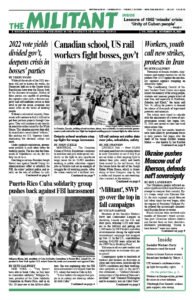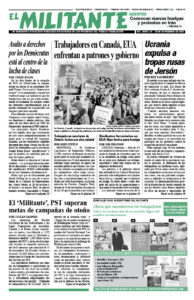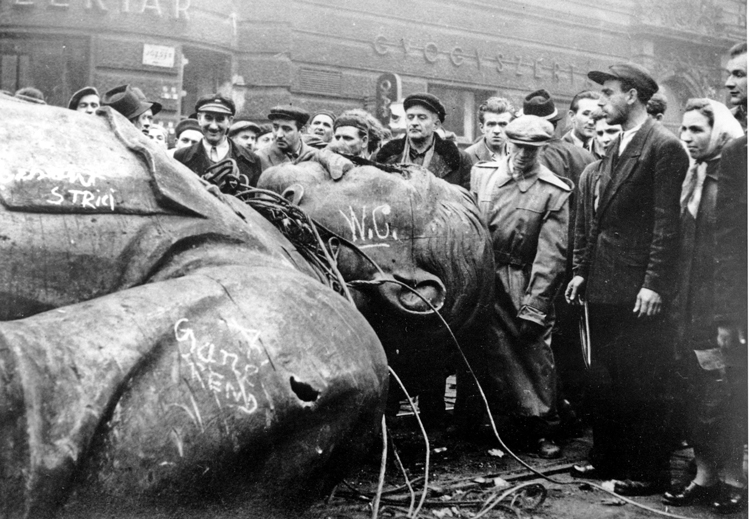One of Pathfinder’s Books of the Month for November is Speeches for Socialism by James P. Cannon. Inspired by the Russian Revolution led by the Bolsheviks, he became a founding leader of the Communist Party in the United States in 1919 and of the Communist International under V.I. Lenin. As the Stalinist counterrevolution in the Soviet Union consolidated, he was expelled from the C.P. in 1928 for supporting the fight led by Leon Trotsky to continue Lenin’s proletarian internationalist course. Cannon led the communist movement that in 1938 became the Socialist Workers Party. The excerpt is from his June 1956 talk, “Khrushchev’s Report to the Twentieth Congress,” given after Soviet Premier Nikita Khrushchev’s secret speech four months earlier was published, including in the Militant. Copyright © 1969 by Pathfinder Press. Reprinted by permission.
[T]he interests and the destiny of the international working class are indissolubly bound up with the interests and destiny of the Soviet Union.
We Trotskyists regard the Russian Revolution of 1917 as the great dividing line in human history. Ascending world capitalism came to a halt there, met with its first defeat, and entered into its decline. The Russian Revolution signalized the real beginning of humanity’s march to the higher and better order of socialism. All social progress in modern times dates from November 7, 1917.
We Trotskyists are internationalists. We have always regarded the Russian Revolution not as an end in itself, but as the starting point of the worldwide socialist revolution. For that reason, from that socialist internationalist standpoint, we have been partisans and defenders of the Soviet Union and the Russian Revolution which brought it into existence, ever since 1917.
Everything that has happened in the thirty-nine-year evolution of the Soviet Union has always had a burning interest for us from that internationalist socialist point of view. Everything we have said and done, either in praise or in criticism, in all the intervening time, has been governed by the single criterion: what is good for the revolution, for the defense of the Soviet Union, for the extension of the revolution throughout the world?
That was our criterion in defending the revolution in its first difficult years when the combined imperialist nations tried to strangle it in the cradle.
That was our criterion in 1928 when we first came out in support of the Left Opposition in the Russian party, in the internal struggle against the bureaucratic degeneration of the revolution under Stalin. The Left Opposition fought under the great slogans of soviet democracy, industrialization, and revolutionary internationalism. It stood for the defense of the Soviet Union by the policy of international class struggle.
We were governed by the same criterion, what is good for the Soviet Union and for its extension throughout the world, in the thirties when we denounced the Moscow trials as frame-ups and protested against the physical extermination of the Old Bolsheviks who were the victims of those trials.
We bring the same criterion, the same basic point of view about the Soviet Union, to the present consideration of the new revelations now coming out of Moscow about the monstrous crimes of Stalin and Stalinism. We discuss them as partisans and defenders of the Soviet Union. …
[T]he events of the Twentieth Congress represent progress because a part of the truth of what has been going on inside the Soviet Union for a long time — to undermine it and endanger it — a part of the truth about that was revealed at the Twentieth Congress for the first time. Truth is always the ally of progress.
In the new revelations, and others that are yet to come, we see the distorted reflection in the top circles of the Soviet bureaucracy of a deep-going movement of the Soviet masses. We are witnessing a new stage in the development of the Russian Revolution, a progressive stage. The Soviet masses are beginning to stir. That’s why the tops are shaking.
The wholesale denunciation and repudiation of Stalin, three years after he is safely dead, sensational and far-reaching as it is, marks only the beginning. The whole story of the monstrous crimes of Stalin and Stalinism has not yet been told. Far from it. But the heirs and accomplices of Stalin, by their preliminary revelations, have set in motion a process that they will never be able to control.
It will not stop until the full truth is known, and until every vestige of Stalinism in the Soviet Union has been swept away by the Soviet masses, and until this foul disease is eradicated from the international labor movement. The truth is on the march again and nothing can stop it. The truth is always progressive. The truth is revolutionary. …
The fact is that the Stalin regime, like every other, had a social basis. Stalin was the representative of the Soviet bureaucracy. Many people, including Khrushchev & Co., enjoyed rich benefits and privileges under the rule of Stalin. They grew prosperous and sleek and fat under Stalin. They drove automobiles and lived in summer cottages and enjoyed all the fruits of the labor of the heroic Russian working class. They were the ones who supported Stalin, and they were well satisfied with his regime. And they supported it in all its crimes.
The privileged beneficiaries of the Stalin regime numbered millions in the Soviet Union. It was not one man alone; there were millions tied to that regime and prospering under it. They were a small minority of the Soviet population, but still they numbered millions. This privileged minority formed the social basis of the Stalin regime. …
There were people in the Soviet Union who recognized the danger of Stalin and Stalinism from the very beginning. They told the truth about it too, and they led the fight against it from the beginning, in 1923, thirty-three years ago. The organizers of the fight against Stalinism were the very same people who organized and led the October Revolution in 1917. The first one to denounce Stalin in writing and to demand his removal, was Lenin. And the second was Trotsky. The same two men who led the great revolution, led the fight against its bureaucratic degeneration under Stalin.


